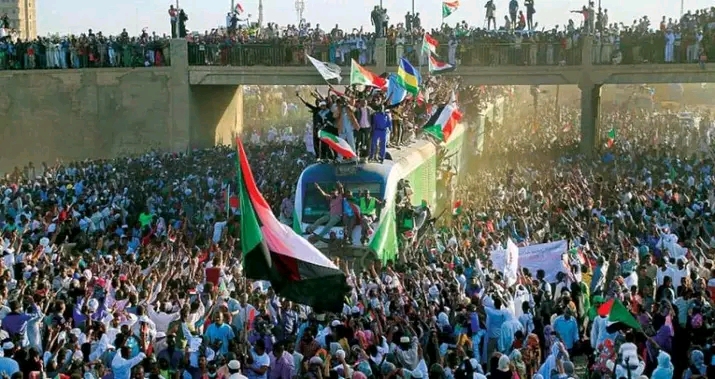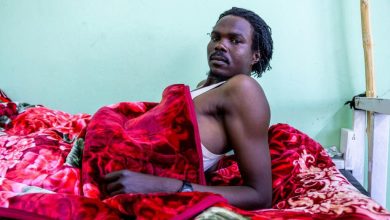Who Lost the December Revolution? (1-3)
Mashawir – Investigative Report by Rabi’a Abu Hanna

The December 2019 Sudanese Revolution marked a turning point in Sudan’s modern history, toppling the regime of ousted president Omar al-Bashir, who ruled the country with an iron grip for over three decades.
Despite its monumental success and the powerful lesson it offered—astonishing the world with the peacefulness of a revolution that shook the thrones of Africa’s strongest dictatorships—the revolution did not follow the expected path toward a genuine democratic transition.
Mashawir spoke with several stakeholders closely tied to the revolution, including politicians, analysts, revolutionaries, and Kandakat (female activists), to answer a crucial question: Was the December Revolution truly lost? Who lost it? How? And why?
Hijacking the Revolution
Hisham Abu Rida, a leading figure in the Broad National Movement, begins:
“From within the sit-in square, we called upon the revolutionary forces to form their own government, because the sit-in was the true parliament of the revolution. That call came from a seasoned political activist with vast revolutionary experience—our late leader Ali Mahmoud Hassanein. Unfortunately, the revolution was lost in exactly the way he feared.”
He continues:
“Hassanein advised the revolutionary forces to submit a letter to the military council demanding immediate transfer of power to civilians, without negotiation or sitting at the table. His fear was delays that could derail the revolution—and that’s exactly what happened.”
Abu Rida explains:
“After those steps, the Islamists hijacked the revolution. We in the Broad National Front believe the hijacking began as early as April 11, 2019, with the statement issued by Jaafar Ibn Auf. That marked the start of the counter-revolution, when the military committee, along with political forces obsessed with power—what we call the ‘soft landing’ and political settlement group—managed to neutralize the revolution’s fire, turning it into a cold comfort for Islamists.”
He adds:
“The hijacking was evident from the early Declaration of the Forces of Freedom and Change (FFC) in January 2019. We objected to the lack of legal and accountability measures. The ‘soft landing’ group, which had stayed in the background, suddenly rushed to the frontlines after the revolution succeeded, positioning themselves as its leaders—and helped derail it.”
Soft Landing and Political Manipulation
Abu Rida continues:
“There were factions within the FFC with differing agendas, but it was the soft landing group that managed to hijack the revolution and weaken its momentum. Hamdok was brought in as Prime Minister, and according to Salah Manna, he and Salah Gosh met Hamdok in Addis Ababa and convinced him to take the post. This shows that Islamist hands were deeply involved in undermining the revolution.”
He adds:
“Still, the revolutionary spirit remained stronger than the political betrayals. When the Islamists failed to extinguish the revolution, they launched this systematic war. We in the Broad Front understand the danger of the Islamists and how organized they are—evident in the militias they established, like the Rapid Support Forces (RSF), born from their own system. This war they’ve unleashed has fooled some into sympathizing with them, especially due to a lack of awareness about their schemes.”
“What’s tragic,” he says, “is that many intellectuals who once opposed the regime have now become mouthpieces defending this war, calling it a war of dignity—just as they once called the South Sudan war a jihad, only for Hassan al-Turabi to later admit those who died weren’t martyrs but mere casualties.”
The People’s Will is Stronger
“The Islamists may have militias—Janjaweed and others like the ‘Al-Baraa Battalions’ and ‘Lightning Strike Brigade’—but the will of the people is stronger,” Abu Rida asserts.
He explains:
“These militias are managed by Islamists like Hasabo Mohamed Abdel Rahman and others, working in tandem with army leaders indoctrinated since the 1990s. Entry to the military academy was only possible through Islamist vetting. So the upper ranks of the army are more loyal to Islamists than to the people.”
“But we are confident this army will be liberated from the Islamists’ grip, these militias will be dismantled, and foreign fighters expelled and held accountable. These crimes won’t go unpunished—they don’t expire with time.”
Security Sector Reform
Abu Rida reveals:
“The Broad National Movement has drafted laws to fight corruption in all its forms—financial, media, and political. We’ve written a transitional constitution, a law for political isolation, a law to restructure the judiciary and security sectors, and another to reform political parties and dismantle sectarianism. But all these efforts were sabotaged by those who opposed reform.
Swift Justice and Delayed Battle
He continues:
“Some within the FFC have actively fought our vision. Yet the laws we drafted are viable and designed to fill any vacuum—guaranteeing swift trials and justice. We won’t replicate the Islamists’ unethical methods. We’ll prosecute Islamists not for affiliation but for actual crimes committed, laying the foundation for a civil, lawful state.”
He concludes:
“We prefer not to speak now of the political forces that weakened this great revolution—because the Sudanese people will hold them accountable. It’s a battle, but a postponed one. The Islamists ignited this war when they realized the revolution’s momentum was too dangerous for them. But it hasn’t achieved their goals nor changed the people’s convictions. The fight continues until this system is uprooted.”
Internal Conspiracy
Amani Abu Idris, a leader in the Ba’ath Party and a women’s rights activist, says:
“December didn’t rise to the level of a full revolution. It was a revolutionary uprising. It hasn’t been lost entirely—but it is going through a difficult regression due to internal and external conspiracies, and due to the revolutionary forces’ own political and organizational weaknesses.”
She adds:
“Still, the spark of awareness ignited by December remains alive, especially among the youth. History proves that revolutions are often reborn multiple times. This painful experience may be essential for building deeper political and social consciousness.”
The Counter-Revolution
Abu Idris continues:
“Among the key reasons for December’s regression is the counter-revolution, embodied by the deep state—the former regime remnants, security and military apparatus (including the military and RSF), and even some political forces and armed movements once aligned with the revolution.”
She adds:
“The revolutionary passion of the protesters outpaced their organizational strength. The collapse of Bashir’s regime was followed by fragmentation within the FFC and Resistance Committees. This ultimately led to the October 25, 2021 coup—and eventually, to war.”
Trusting the Army Was a Mistake
Dr. Tamador Al-Tayeb, a university professor, believes:
“Everyone contributed to the failure of the December Revolution. Some of us—including myself and Hamdok—trusted the army. We believed they would stick to the agreement and hand over power to civilians as scheduled.”
She adds:
“This trust was a major mistake. Others had no such faith in the military and predicted a coup before the power transfer—exactly what happened.”
The ‘Banana Sit-In’
Dr. Al-Tayeb points to another group:
“Others saw the revolution as an opportunity for personal gain. A clear example is the so-called ‘Banana Sit-In’ group that backed the military’s coup against the transitional civilian government.”




